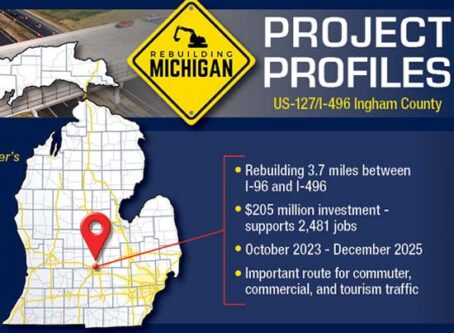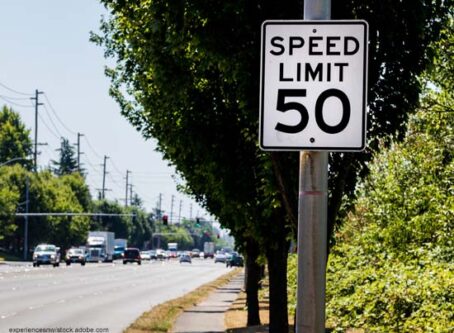Michigan bill, new laws focus on road funds
One effort to raise revenue for Michigan roads is beginning its trek through the statehouse while two more bills to aid road work have completed their journey through the statehouse.
While Gov. Gretchen Whitmer and state legislators continue to wrestle over long-term transportation funding solutions, smaller efforts to provide a boost to the state’s road and bridge account continue.
Blast from the past
A Senate bill would raise additional revenue for Michigan roads by offering vehicle owners the option to purchase nostalgic license plates.
Sponsored by Sen. Mallory McMorrow, D-Royal Oak, SB1146 would make available the state’s blue license plate design issued from 1983 to 2007.
“Any Michigander who grew up here in the ’80s and ’90s remembers the simple, iconic design and knows bringing back the blue plate is a no-brainer,” McMorrow said in prepared remarks.
Additionally, the state’s black plate design used from 1979 to 1983 would also be offered.
The plates would be available for an additional fee of $100. All revenues would be directed to the state’s transportation fund.
“Bringing back the blue plate offers a creative way to generate much-needed revenue to help fix the roads without raising taxes,” she said.
McMorrow said she is hopeful that offering the “iconic” license plates in the Great Lakes State would provide the same funding boon seen in California with the black-and-yellow 1960s style license plate. The Golden State raises more than $6 million annually from the nostalgic plate that has an initial $50 fee and a $40 annual renewal fee.
A fiscal note is not yet attached to McMorrow’s bill.
SB1146 is in the Senate Transportation and Infrastructure Committee.
Local road aid
Two new laws in Michigan would also aid transportation work.
Gov. Whitmer has signed into law a bill package that is touted to give local governments more flexibility to prioritize their road repair schedules.
The first bill, HB4965, now law amends the state’s road funding formula to give counties more say on how state fuel tax and vehicle registration revenue is spent locally.
Michigan’s current road spending formula stipulates that 75% of funding be spent on primary roads. Local roads receive 25%.
Rep. Rodney Wakeman, R-Saginaw Township, said a blanket 75/25 rule on primary and local road repair allocation is not practical for every community.
“There’s no doubt Michigan’s previous road funding formula helped contribute to our current roads dilemma, which we have been spinning our wheels trying to solve for decades,” Wakeman said. “It was never about how much money we were spending for road repairs. It was how smart we were spending it.”
The new law also will provide local governments with more flexibility when deciding how to spend road repair money and when determining which roads get repaired.
“Locals know their roads better than Lansing does,” Wakeman added.
The requirement for local governments to submit their asset management plans to an oversight commission will not be altered.
The second bill signed into law, HB4966, covers the use of funds available for cities and villages. All state transportation funds distributed to a city or village will be required to be used for municipal streets. LL
More Land Line coverage of news from Michigan is available.









